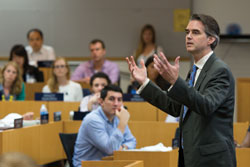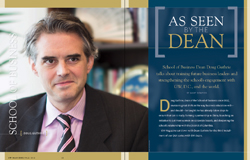As Seen by the Dean
School of Business Dean Doug Guthrie talks about training future business leaders and strengthening the school's engagement with GW, D.C., and the world.
Doug Guthrie, dean of the School of Business since 2010, envisions great shifts in the way business education will—and should—be taught. He has already taken steps to ensure that GW is ready, forming a partnership in China, launching an initiative to put more women on corporate boards, and deepening the school's relationship with the District of Columbia.
GW Magazine sat down with Dean Guthrie for the third installment of our Q&A series with GW deans.
Q: There has been a lot of talk about business education in the wake of the global recession. What are the big take-aways for people like you who are helping to shape the next generation of business leaders?
A: Business education does a tremendous job of teaching people core functional areas about how to operate within a capitalist economy. However, in the past, business schools have focused on those technical areas without thinking in a larger social context. And that's been a dangerous way to teach.
In 2001, rogue traders thought about making a lot of money for Enron but not about the losses if Enron collapsed. Then there was the crisis of 2008-2009, in which traders were taught to build structures like mortgage-backed securities without thinking about the impact on society. The most important thing is to be thinking about the role of business in society.
Business schools must also be much more deeply engaged in their universities. If we're going to have strong programs that train students about renewable energy and sustainability, we have to be working with the School of Engineering and Applied Science and the Law School to teach students about the technical and legal aspects of the design. If we want to train students in the area of business ethics, we need to be working with the philosophy department. If we want to train them in the global economy, we need to be working with the Elliott School of International Affairs.
Q: One of the school's newest initiatives is On Board, which prepares female executives to serve on corporate boards. What sets it apart from other programs to build boards?
A: This was the brainchild of Linda Rabbitt [MA '72], a trustee of the university who gave a very generous gift to start the program. It's well known that there is a glass ceiling in corporate leadership. Only about 15 percent of the Fortune 500 companies have women on their boards. We care about gender parity, and we care about solutions. So we'll prepare women to serve on corporate boards. For example, there's a New York Stock Exchange certification that guarantees that you have the knowledge to be on an audit committee. Most women don't have that. Our program will focus on leadership elements like that.
What differentiates this program is that we have a close partnership with the International Women's Forum and its network. And we have built a curriculum for this initiative that is deeper than similar programs at other universities.
Q: You're not a typical business school dean. You were barely 41 when you became dean. You speak Mandarin Chinese. You don't have an MBA or a degree in finance—your academic background is in the social sciences and humanities. How does this affect the way you view business education?
A: It applies directly to where I see business schools going. When I graduated from college, I was an area studies major in Chinese language and literature. I believed that to understand China you needed a deep understanding of the culture. The other part comes out of organizational philosophy—the subject of my PhD—and that's the need for corporate responsibility and business ethics.
These values for me were the product of humanities, in the first place, and of social sciences, in the second place.
Being removed from their universities and from society has hurt business schools. I'm a huge believer that business schools have to draw from the disciplines including humanities. There are plenty of people with great critical-thinking minds in the humanities who can help people think about the role business should play.
Q: GWSB has a new partnership in Suzhou, China, in collaboration with Renmin University of China-International College. You did your dissertation research in China, and your 2009 book, China and Globalization, looked at China's role in the world. What does the China initiative mean for students—and for the school?
A: Having deep knowledge and deep ties to a specific place in the world is a critical part of successfully doing business in the global economy. It's wonderful that we have a large and robust international business department in this school, but we need to take it a step further. We need to think about deep institutional relationships in different parts of the world. It's not just about creating opportunities for students and for faculty to do research; we need to think about how we actually change as an institution by having deep relationships.

Dean Guthrie addresses an MBA cohort during orientation.
Jessica McConnell Burt
Our identity as a school and the type of students that we attract will be built around these deep relationships. All sorts of opportunities will come about for our students—both our Chinese students and our American and international students.
Even as you're looking to the other side of the globe, GWSB is also planting deeper roots in Washington, D.C.
We cannot be removed from the societies with which we co-exist—whether we're talking about deep relationships with China or deep relationships with the nation's capital. There are some business schools that build deep relationships with major corporations or industries. But I think the more interesting relationships are with local economies.
There is no more interesting opportunity than that of Washington, D.C. It's a mid-sized city but, at the same time, a cultural center and the capital of the nation. What happens in D.C. really matters. There are lots of strengths in the city. It is the large base of a federal procurement industry. It has a powerful real estate industry that hasn't declined like that of the rest of the country. It also has some of the highest unemployment rates in the entire country. The mismatch between the industries that exist and the jobs that are needed is quite striking.
Q: What does the GWSB-DC collaboration involve?
A: We've done three basic things. We've contributed resources. We fund a mayoral fellowship that allows a student from GWSB—an MBA student—to work in the mayor's office on the international development side. We also partially fund a student in real estate. We want to provide MBA students with an opportunity to do interesting work and the city to have the kind of resources that it needs.
We've also begun to work closely with the city to develop its international development strategy. I traveled to China with Victor Hoskins, D.C.'s deputy mayor for planning and development. We spent time trying to uncover relationships that could lead to investment in D.C. We're continuing to develop that.
The third thing is that we helped put together—with Georgetown's McDonough School of Business, Howard University, and American University—the city's strategic economic development plan. We created summer internships for 15 MBA students in D.C. to really help the city think about its five-year plan for growth.
Q: In your regular column on Forbes.com, you've written about creative leadership. What is the school's Creative Leadership in Civic Life initiative?
A: Leadership in business schools is usually in the corporate sector. Our work with the District of Columbia got us thinking about leadership and civic life. Take someone like Victor Hoskins [deputy mayor for planning and economic development]. He's never been elected to office, and probably doesn't want to be, but he's interested in the creative transformation of our world. Or Marin Alsop [music director of the Baltimore Symphony Orchestra]. Look what she's done for the economy of Baltimore. Or Magic Johnson and how he developed his fame into philanthropy. Or look at one of our alumni, Charley Bendit [BBA '75], a New York real estate developer whose civic engagement has been transformative for the Meatpacking District. We're bringing creative leaders like that to GWSB for leadership dialogues.
Q: You played guitar with the School of Business Follies sketch comedy club. In late January you were on vocals and guitar at the students' Business Gives Back fundraiser. Last year, you were part of a band—which included President Steven Knapp—that performed at GW's Leadership Retreat. What's the story with you and music?
A: Music has always been part of my life. My parents were—my whole family was—very into folk music, and we played music with other families. It's been fun to be able to turn back to that part of my upbringing now and then. I'm still waiting to see if my kids [a 4-year-old daughter and 2-year-old son] are heading in that direction. I like to describe myself as "a good enough guitarist to know I'm not very good."
Q: Your biggest surprise since becoming dean at GWSB?
A: The most exciting surprise has been how much we really are on the cusp of a revolution in business school education and how important it is to be participating in that revolution from Washington, D.C. There has to be deep engagement with what it means to be a responsible business school that is training ethical leaders for the future. We're at a moment where a lot of universities and people are ready for that conversation. I never imagined how fun it would be to be a part of it.

